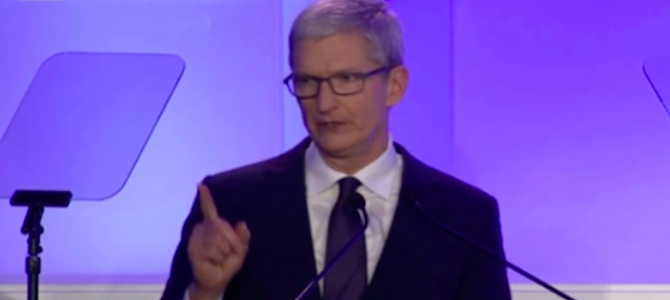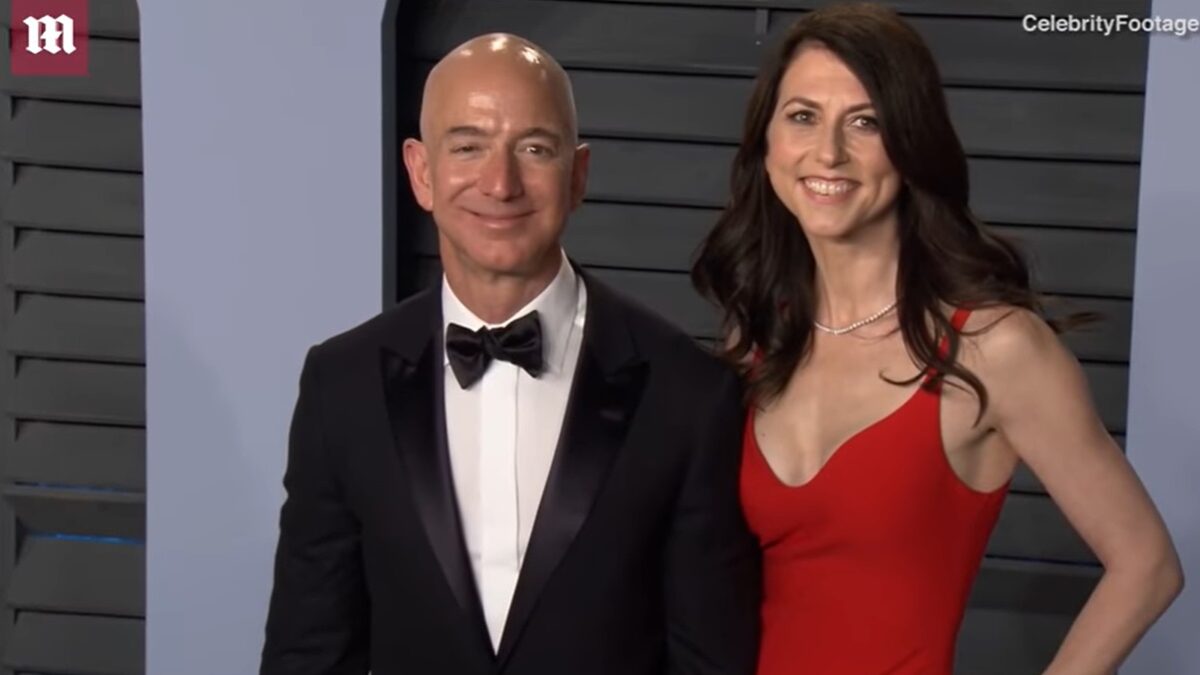
Should Apple consider ideological diversity when selecting its board of directors? One shareholder thinks so, and went through to great lengths to make his “ideological diversity” proposal appear on Apple shareholders’ ballot this year. Apple management, on the other hand, has gone to the Securities and Exchange Commission with a request to dismiss this proposal, saying shareholders won’t understand the meaning of “ideological diversity.”
This is truly a David vs. Goliath story. The David in this case, the persistent Apple shareholder, is Justin Danhof, general counsel of National Center for Public Research and its Free Enterprise Project (FEP). In an interview, I asked what prompted him to want to do a shareholder proposal on “ideological diversity” in the boardroom. Danhof points out that liberal organizations “annually file more than 95 percent of all policy-oriented shareholder resolutions,” through which they exert undue influence over corporate America.
To counter the liberals’ push, the FEP, which launched in 2007, is the conservative movement’s only full-service shareholder activism and education program. According to the organization’s website, FEP annually files more than 90 percent of all right-of-center shareholder resolutions. How to define and achieve diversity in the boardrooms is their latest battle.
Liberals have been aggressively pushing for diversity in boardrooms based on sex and race. In 2018, CtW Investment Group, a coalition that works with “pension funds sponsored by unions affiliated with Change to Win,” introduced an Amazon shareholder proposal on “board diversity.” The proposal “calls on the Amazon board of directors to implement a ‘Rooney Rule’ requiring that the initial list of candidates from which new management-supported director nominees are chosen should include (but need not be limited to) qualified women and minority candidates.”
The Rooney Rule And Quotas
The Rooney Rule is a policy implemented by the National Football League in 2003 that requires NFL teams to interview at least one minority candidate for any open head coaching or general manager position. At the time of implementation, there were two minority head coaches in the NFL. Since then, the number of African-American coaches in the NFL has increased. But there is no hard evidence to prove whether they were helped by the rule or would have become head coaches anyway without it.
However, lacking hard evidence hasn’t stopped liberal groups from pushing the Rooney Rule everywhere else, especially in corporate America’s boardrooms. CtW cited Microsoft and Costco, among other companies, that have implemented the Rooney Rule in their director search. CtW pushed Amazon to do the same.
To boost its case, CtW cited a 2017 study that found “companies with the most diverse leadership (top quartile) for gender were 21% more likely to earn above average profits, while those in the top quartile for ethnic/cultural diversity were 33% more likely to outperform.”
However, another 2018 study done in Europe based on a decade of data from Norway and other European countries with mandatory gender quotas for women on corporate boards shows quotas at the board level have done little to boost corporate performance and corporate governance, as proponents promised. Nor did it help women lower down. But the state of California enacted a new law in 2018 to mandate quotas for women on public companies boards anyway.
Amazon’s board, which currently includes seven men and three women, initially recommended voting against CtW’s diversity proposal, reasoning they didn’t want to participate in “box checking” and “tokenism.” But they quickly reversed course and adopted the proposal under internal and external pressure.
Diversity Isn’t Just Sex and Race
Danhof decided to push back on the narrow definition that diversity is only about gender and race. He cleverly modeled his proposal after similar liberal diversity proposals. For example, liberals demanded Exxon Mobile “disclose to shareholders each director’s/nominee’s gender and race/ethnicity, as well as skills, experience” in a matrix form. So in his shareholder proposal, Danhof says Apple should:
adopt a policy to disclose to shareholders the following: 1. A description of the specific minimum qualifications that the Board’s nominating committee believes must be met by a nominee to be on the board of directors; and 2. Each nominee’s skills, ideological perspectives, and experience presented in a chart or matrix form.
Danhof explained to me that, unlike the liberals, he doesn’t advocate for a quota of conservatives on corporate boards. He believes in free enterprise and has no desire to dictate how Apple implement his diversity proposal, should it pass.
While acknowledging “a diverse board is a good indicator of sound corporate governance and a well-functioning board,” Danhof says he only wants to raise awareness that “true diversity comes from the diversity of thoughts.” He sees ample evidence that “the company – and Silicon Valley generally – operate in ideological hegemony that eschews conservative people, thoughts, and values. This ideological echo chamber can result in groupthink that is the antithesis of diversity.” Remember that Google fired James Damore for writing a memo on his thoughts on sex diversity.
As a shareholder, Danhof is concerned because the lack of diversity of thought can be “a major risk factor for shareholders” as American corporations have increasingly inserted themselves into political issues, from joining the fight against North Carolina’s bathroom bill to Gillette’s commercial lecturing men about toxic masculinity. Some of this political activism has hurt corporate bottom lines, in turn hurting shareholder value.
Exhibit A is that, after Dick Sporting Goods banned the sale of certain types of guns in February 2018, its overall store sales went down. Danhof hopes that diverse opinions in the boardroom will help corporations make better decisions that will benefit shareholders in the long run.
Apple is not the first company to whom Danhof proposed “ideological diversity” among their board of directors. Danhof filed similar proposals with Facebook, Twitter, and Starbucks. Normally, when a shareholder proposes a corporate policy change through proxy, the corporation has three ways to respond: negotiate with the shareholders and adopt the proposed or modified policy change without a ballot, leave it on the ballot, or fight to kick it off the ballot. Danhof approached Pepsi Co with a similar proposal. Pepsi adopted his proposal without a ballot vote.
The Great Apple Fight
But the mighty Apple chose to fight. It requested the Securities and Exchange Commission (SEC) kick Danhof’s “ideological diversity” proposal off the ballot. In a letter to the SEC, an Apple lawyer argues that Danhof’s proposal is “vague and indefinite,” and ‘ideological perspectives’ is not something that is commonly understood or well-defined.” Therefore, Apple says this proposal cannot be implemented. In addition, Apple insists it already meets SEC requirements by providing sufficient information on its board of directors.
But Danhof points out that Apple’s pushback to the “ideological diversity” proposal is really a desperate move to keep its groupthink in the boardroom intact, because “most middle-school students understand the concept of ideological diversity.”
Yet Apple seems very dismissive of its shareholders. Since Apple only chooses prominent figures to sit on its board, these prominent figures’ political alliances are well-known to the general public. For example, does anyone doubt where Al Gore, a long-time Apple director, stands ideologically? Apple CEO Tim Cook is especially vocal on his liberal political views and he has often done so on behalf of Apple. Without a diversity of ideas in the boardroom, no one is pushing back on him.
Fortunately, Danhof is well-versed in precedents, SEC rules and regulations, and shareholder activism. After several months of back and forth with Apple lawyers and SEC officials, the SEC sided with him. The “True Diversity Board Policy” is on Apple Shareholders’ ballots now and the annual shareholder meeting is set on March 1st.
I asked Danhof if he expects his proposal to pass at the annual meeting. He doesn’t think so because most institutional investors in the United States rely on proxy voting recommendations from one of the two proxy advisory firms, Institutional Shareholder Services (ISS), and Glass Lewis and Co. Both firms are left-leaning and wield outsized influence on corporate boards (the two firms control 97 percent of the proxy advisory market).
They have used their influence and bias to promote ideas that are based on liberal ideology, not necessarily what’s best for shareholders. Both firms have recommended investors vote no on the “ideological diversity” initiative.
Still, having the “ideological diversity” proposal on shareholders’ ballots is a big win for Danhof, the FEP, and conservatives in America. Liberals have been very good at taking advantage of existing laws, regulations, and systems to advance their ideology in many aspects of our society. It’s about time conservatives catch on, push back, and let our voice be heard. Danhof and the FEP just showed us how.









